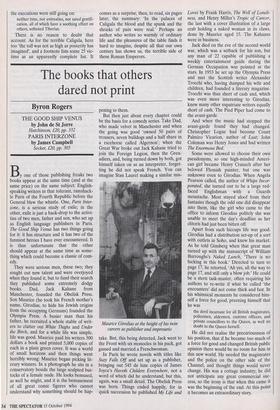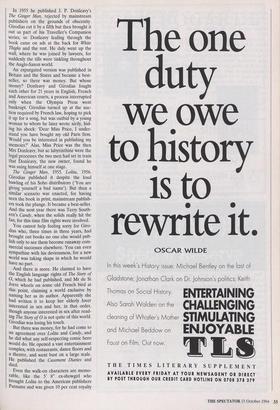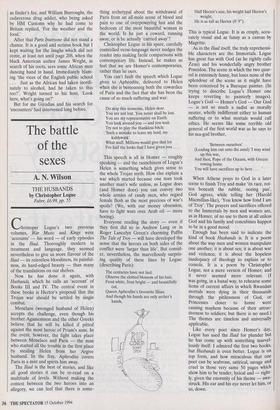The books that others dared not print
Byron Rogers
By one of those publishing freaks two books appear at the same time (and at the same price) on the same subject: English- speaking writers in that tolerant, ramshack- le Paris of the Fourth Republic before the General blew the whistle. One, Paris Inter- zone, is a serious study of exile; in the other, exile is just a back-drop to the activi- ties of two men, father and son, who set up as English language publishers in Paris. The Good Ship Venus has two things going for it: it has structure and it has two of the funniest heroes I have ever encountered. It is thus unfortunate that the other should appear at the same time as some- thing which could become a classic of com- edy.
They were serious men, these two; they sought out new talent and were overjoyed when they found it, but to fund their search they published some extremely dodgy books. Dad, Jack Kahane from Manchester, founded the Obelisk Press. Son Maurice (he took his French mother's name, Girodias, to hide his Jewish origins from the occupying Germans) founded the Olympia Press. A busier man than his father, he recruited a whole stable of writ- ers to clatter out White Thighs and Under the Birch, and for a while life was simple, life was good. Maurice paid his writers 500 dollars a book and printed 5,000 copies of each in a plain green cover. It was a world of small horizons and then things went horribly wrong: Maurice began picking lit- erary winners. In a photograph he sits in a conservatory beside the large sculpted but- tocks of a female nude. He looks bemused, as well he might, and it is the bemusement of all great comic figures who cannot understand why something should be hap- pening to them.
But then just about every chapter could be the basis for a comedy series. Take Dad, who made velvet in Manchester and when the going was good 'owned 50 pairs of trousers, seven bulldogs and a half share in a racehorse called Algernon'; when the Great War broke out Jack Kahane tried to join the Foreign Legion, then the Gren- adiers, and, being turned down by both, got himself taken on as an interpreter, forget- ting he did not speak French. You can imagine Stan Laurel making a similar mis- Maurice Girodias at the height of his twin careers as publisher and impresario take. But, this being detected, Jack went to the Front with six monocles in his pack, got gassed and married a Frenchwoman.
In Paris he wrote novels with titles like Suzy Falls Off and set up as a publisher, bringing out 545 de luxe copies of James Joyce's Haveth Childers Everywhere, not a word of which did he understand, but this, again, was a small detail. The Obelisk Press was born. Things ended happily, for in quick succession he published My Life and Loves by Frank Harris, The Well of Loneli- ness, and Henry Miller's Tropic of Cancer, the last with a cover illustration of a large crab holding a naked woman in its claws, done by Maurice aged 15. The Kahanes were in business.
Jack died on the eve of the second world war, which was a setback for his son, but any man of 22 capable of publishing a weekly entertainment guide during the German Occupation was pointed at the stars. In 1953 he set up the Olympia Press and met the Scottish writer Alexander Trocchi who, having dumped his wife and children, had founded a literary magazine. Trocchi was thus short of cash and, which was even more interesting to Girodias, knew many other expatriate writers equally short of cash. The Pied Piper had come to the avant-garde.
And when the music had stopped the avant-garde found they had changed. Christopher Logue had become Count Palmiro Vicarion, author of Lust; John Coleman was Henry Jones and had written The Enormous Bed.
Some were allowed to choose their own pseudonyms, so one high-minded Ameri- can girl became Henry Cranach after her beloved Flemish painter, but one was unknown even to Girodias. When Angela Pearson called, the author of Whips Incor- porated, she turned out to be a large red- faced Englishman with a Guards moustache. Most stayed aloof from their fantasies though the odd one did disappear into them, like the girl who came to the office to inform Girodias politely she was unable to meet the day's deadline as her clitoris had just been bitten off.
Apart from such hiccups life was good. Girodias had a distribution set-up of a sort with outlets in Soho, and knew his market. As he told Ginsberg when that great man turned up with the manuscript of William Burroughs's Naked Lunch, 'There is no fucking in this book.' Directed to turn to page 17, he retorted, `Ah yes, all the way to page 17, and still only a blow job.' He could be a stern task-master, often requiring his authors to re-write if what he called 'the encounters' did not come thick and fast. In his whimsical moments he considered him- self a force for good, preening himself that he was
the devil incarnate for all British magistrates, policemen, aldermen, customs officers, and private councillors to the Queen, as well no doubt to the Queen herself.
He did not realise the precariousness of his position, that if he became too much of a force for good and changed British public opinion there would be no room for him in this new world. He needed the magistrates and the police on the other side of the Channel, and thought things would never change. His was a cottage industry; he did not anticipate any great commercial suc- cess, so the irony is that when this came it was the beginning of the end. At this point it becomes an extraordinary story. In 1955 he published J. P. Donleavy's The Ginger Man, rejected by mainstream publishers on the grounds of obscenity. Girodias cut it by a fifth but then brought it out as part of his Traveller's Companion series, so Donleavy leafing through the book came on ads at the back for White Thighs and the rest. He duly went up the wall, where he was joined by lawyers, for suddenly the tills were tinkling throughout the Anglo-Saxon world.
An expurgated version was published in Britain and the States and became a best- seller, so there was money. But whose money? Donleavy and Girodias fought each other for 21 years in English, French and American courts, a process interrupted only when the Olympia Press went bankrupt. Girodias turned up at the auc- tion required by French law, hoping to pick it up for a song, but was outbid by a young woman to whom he later wrote airily, hid- ing his shock: 'Dear Miss Price, I under- stand you have bought my old Paris firm. Would you be interested in publishing my memoirs?' Alas, Miss Price was the then Mrs Donleavy, but so labyrinthine were the legal processes the two men had set in train that Donleavy, the new owner, found he was suing himself at one stage.
The Ginger Man, 1955. Lolita, 1956. Girodias published it despite the loud bawling of his Soho distributors (`You are giving yourself a bad name'). But then a similar scenario was enacted, for having seen the book in print, mainstream publish- ers took the plunge. It became a best-seller. And the next year there was Terry South- ern's Candy, when the solids really hit the fan, for this time film rights were involved.
You cannot help feeling sorry for Giro- dias who, three times in three years, had brought out books no one else would pub- lish only to see them become runaway com- mercial successes elsewhere. You can even sympathise with his deviousness, for a new world was taking shape in which he would have no part.
And there is more. He claimed to have the English language rights of The Story of 0, which he had published, and Mr de St Jerre wheels on some old French bird at this point, claiming a world exclusive by naming her as its author. Apparently she had written it to keep her elderly lover interested in sex and her, in that order, though anyone interested in sex after read- ing The Story of 0 is not quite of this world. Girodias was losing his touch. But there was money, for he had come to an agreement over Lolita and Candy, and he did what any self-respecting comic hero would do. He opened a vast entertainment complex, with restaurants, dance floors and a theatre, and went bust on a large scale. He published the Casement Diaries and died.
Even the walk-on characters are memo- rable, like the 5' 8" ex-showgirl who brought Lolita to the American publishers Putnams and was given 10 per cent royalty as finder's fee, and William Burroughs, the cadaverous drug addict, who being asked by HM Customs why he had come to Britain replied, Tor the weather and the food.'
After that Paris Interzone did not stand a chance. It is a good and serious book but I kept waiting for the laughs which did not come, at least not until page 208, when the black American author James Wright, in search of his roots, sees some African men dancing hand in hand. Immediately blam- ing 'the vices of the English public school . . Just as the African had taken inordi- nately to alcohol, had he taken to this too?', Wright turned to his host, 'Look here, what's going on?'
But for me Girodias and his search for `encounters' had intervened long before.




























































 Previous page
Previous page